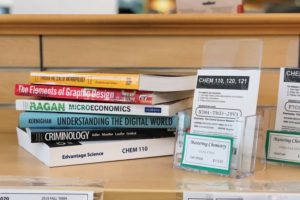Camosun College recently received $32,250 from BCcampus in order to establish the Open Education Demonstration Initiative.
The college received the money in the form of an Institutional Sustainability Grant from BCcampus—a publicly funded organization that aims to make post-secondary education accessible to everyone—and will use it to redevelop 10 courses with open textbooks through a committee of up to 10 faculty members, librarians, curriculum developers, and other specialists.
Camosun College director of learning services Sybil Harrison is very enthusiastic about the grant.
“I think we’ve got the funding for 18 months, so it will take us a little while to get all the work done,” says Harrison. “It’s not just about developing specific resources, but how we as an institution can increase the use and adoption of open educational resources.”

Harrison believes that the development of open learning will be just as helpful for faculty as it will be for students.
“It’s more comprehensive than just thinking about how to support faculty with developing their favourite textbook or course pack,” says Harrison. “Some of them might be developing new material; some of them might need support in adopting materials that have already been developed.”
Camosun College Student Society (CCSS) external executive Fillette Umulisa says that the CCSS is pleased about Camosun moving forward on open educational resources.
“We all know that the cost of textbooks is a huge financial barrier to many of the students,” says Umulisa. “I think it’s going to save students a lot of money, and it’s going to make it easy for students to access textbooks without having to line up at the bookstore. It’s also going to make it more flexible for faculty to customize their learning outcome.”
Harrison is pleased with how open-textbook learning will support students with educational challenges.
“We can thread some of the important educational initiatives into the work that we’re doing,” says Harrison. “Accessibility is really important to us. So, some students might have visual difficulties, some students might have a learning disability, so… we can use open educational resources to really make the content accessible to everybody, regardless of where you’re coming from or what your abilities may be.”
Harrison says that she wants to make sure that the college’s core values are always taken into account.
“Making sure that the materials reflect our institutional values around Indigenization, around inclusion… That’s the really amazing thing around open educational resources—you can adopt materials that someone else has created and then put your own spin on it,” she says. “Make it applicable for this context, this place, this time.”
Umulisa says that the availability of open textbooks will create new options for students.
“I feel like a lot more students will have access to educational material, much more than they currently do, because sometimes the bookstore runs out of textbooks, or sometimes we just can’t purchase because they’re really expensive,” she says.
Umulisa believes that this is all a step in the right direction for the college.
“The Camosun College Student Society is really pleased with this initiative,” she says. “We’re going to continue to work with the college, to see that the $32,500 does make a positive change for the college—and for our students.”
